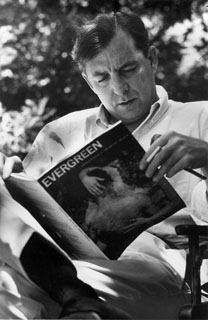

Terry
Southern's School of Satire
Appreciation
By Henry
Allen
Washington Post
Staff Writer
Photo by Steve Shapiro
Hunter Thompson, a glass of Wild Turkey in hand, and his skull face finally relaxing, didn't see the Terry Southern question coming. It was 1972 and he'd just finished another story about fear and loathing on the campaign trail, this one featuring a bellboy beating a snake to death with a vacuum cleaner.
Now, it was Turkey time.
The question: Had he ever read a book called "The Magic Christian" by Terry Southern?
He bent backward in an electroconvulsive spasm, as if he'd just sleepwalked into an electric fence.
"Yes," he shouted. "Yes, my God."
He looked at his questioner as if to say: "Are you one of ... us? One of those who know?"
Even then, with the novel "Candy," written with Mason Hoffenberg, having been a wild national scandal, Southern was a connoisseur's taste, if. there can be connoisseurs of a writer. who once said that as a boy in Texas he wanted to rewrite all of Poe's stories because they didn't go "far enough."
"Have you read it?" Thompson asked. It was about a sly multimillionaire named Guy Grand who went from chapter to chapter proving the chaos and degradation money could buy.
"I started reading it and I thought I was going to go insane,' Thompson said. 'it was an incredible influence on me, that last scene with the gorilla running around on the bridge of the ship, my God, it was so great.'
"The important thing in writing is the capacity to astonish," Southern told Life magazine in 1964. "Not shock--shock is a worn-out word--but astonish. The world has no grounds whatever for complacency.'
Southern died yesterday at the age of 71. A lot of his stuff is less printable now than it was in the 50s, before corsets came off women's hips and got strapped onto people's minds.
In "Candy" the Pert, cutie-pie heroine ends up writhing around with a Psychotic hunchback. "Your hump! Your hump!" she kept crying, scratching and clawing at it now."
 Southern knew he was outraging puritans of
feminism, mental illness and disfigurement. Southern was either
way ahead of his time or way behind it, it's hard to tell. In any
case, nobody astonishes now in this Decade of the Dead, and
nobody seems to have any of the fun Southern had.
Southern knew he was outraging puritans of
feminism, mental illness and disfigurement. Southern was either
way ahead of his time or way behind it, it's hard to tell. In any
case, nobody astonishes now in this Decade of the Dead, and
nobody seems to have any of the fun Southern had.
He was a master of American clichés, expectations and pieties, of a world creaking with irony and alive with a topiary of quotation marks and not-quite-appropriate exclamation points.
In "The Magic Christian," his zillionaire Protagonist takes over a Fifth Avenue cosmetics company and announces a vile-smelling deodorant to his executives: "Gentleman, I say this Product may well spell 'home run, in the hearts of Mr. and Mrs. U.S.A.!"
This was language that would have gone over quite nicely it the Rotary meeting in Conshohocken. Pa., but Southern's readers were in on the joke. Southern was a bard of the Hip Age, and the essence of hip was being in on the joke, aware of the irony and facetiousness of even your compadres in hipness, who would tell you sly, oblique stories about how they'd learned to live with no sleep at all, or how Bela Bartok's mistress wrote all his music, and somebody would say, "He's putting you on, man."
Hipness was a constant struggle over information and who controlled it. you, the government, the newspapers, the guy drinking coffee at the next table. If you put him on, you controlled it. Terry Southern took this grim doctrine and made it funny, satirizing both hip and square in a style of spectacular grace, clarity and modulation through all the realities you could bite into like a napoleon, all the flaky layers.
He was one of the last of the Paris literati, in those Jean-Seberg-George Plimpton years after World War II, and one of the first of the postmoderns. He helped write "Dr. Strangelove," which features the famous "Gentlemen, you can't fight in here! This is a war room!" He was a writer on "Easy Rider," which summed up the whole counterculture-communal drug fantasy with the fine 'We blew it."
There are moments in his books that still astonish you and there are moments that make you feel that you probably had to have been there. Along with Thompson, Kurt Vonnegut and Ken Kesey, he's one of the last writers in America to be a culture hero, as opposed to a celebrity, which he never was.
From 1970 to 1992 he wrote one script and no books. He couldn't go on being hip forever. In 1992 he published a coming-of-age novel called 'Texas Summer." It vanished with a very small trace. And now Southern himself has vanished with a considerably larger one.

Return to Home of Terry Southern